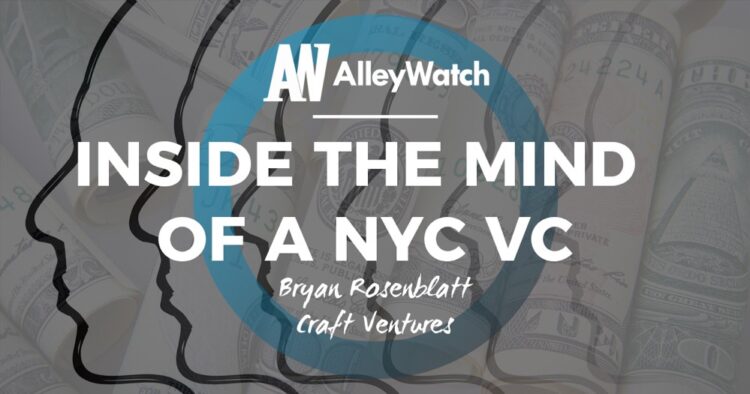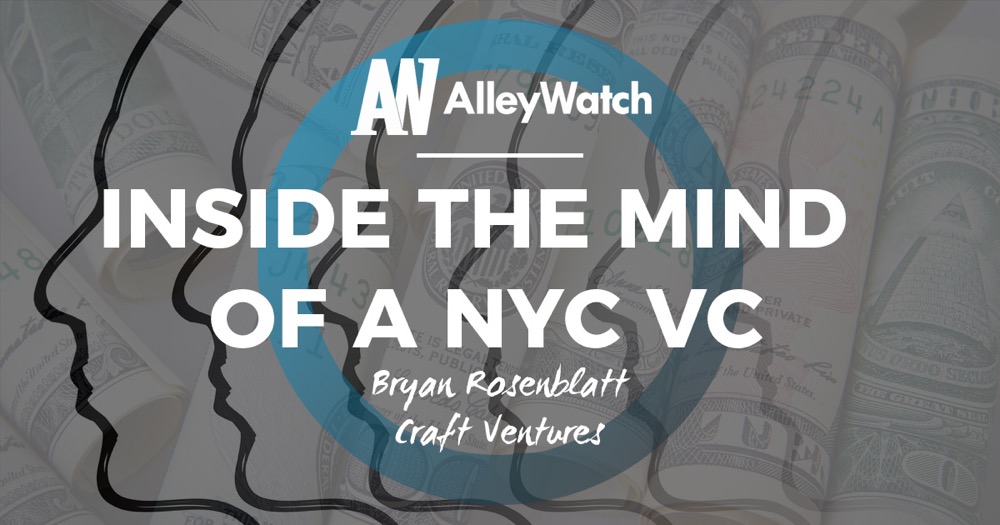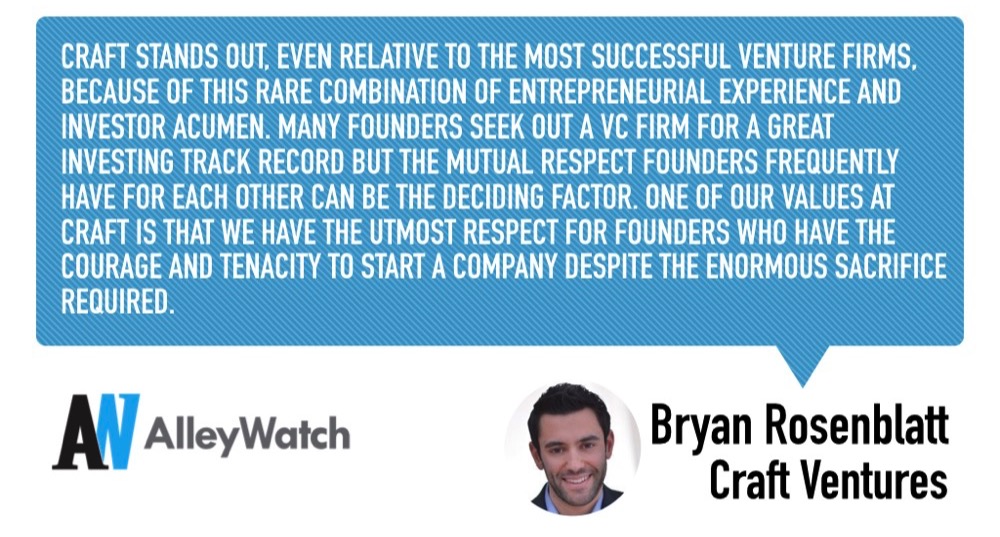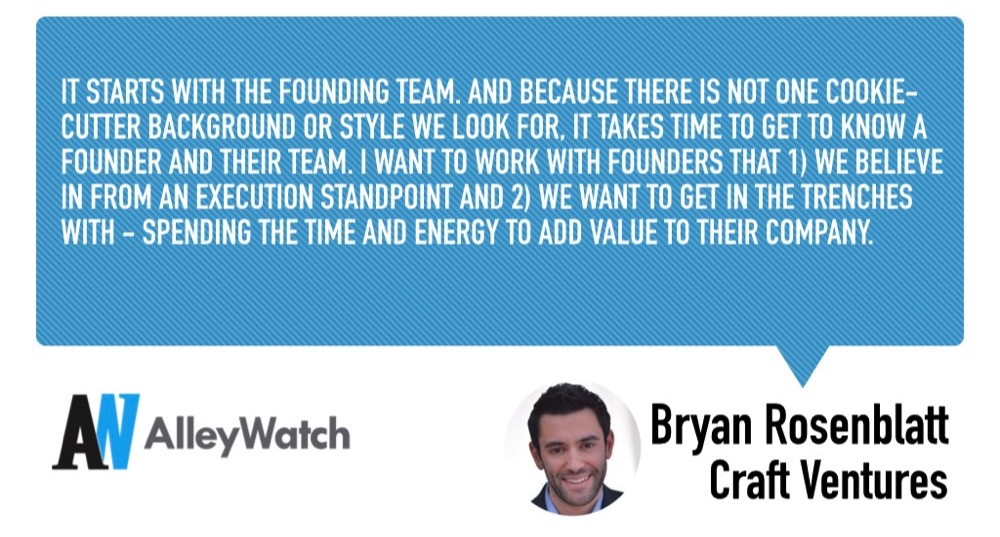Welcome back to Inside the Mind of an NYC VC, a highly acclaimed series at AlleyWatch in which we speak with New York City-based Venture Capitalists. In the hot seat today is Bryan Rosenblatt, a Principal at Craft Ventures, the early-stage venture firm led by three very successful founders (Bill Lee, Jeff Fluhr, David Sacks) with deep operating experience that was founded in 2017. Craft has already made investments in over 20 companies including investment in Bird, SpaceX, Harbor, Reddit, and Cloud9.
Bryan joined Craft in the fall of 2018 as its first full-time NYC hire, as the firm looks to increase its presence in the burgeoning New York market. Bryan, a vet of the tech ecosystem with previous roles at Reddit, Twitter, and CBS Radio, has been an active angel investor in New York for several years, managing a syndicate of over 500 accredited investors through Riverside Ventures. Riverside has sourced and made investments in companies like Slack, Bonobos, Layer6, Meural, YayPay, and Public Goods.
Bryan was kind enough to visit our offices in Soho and we got to learn more about his path to venture, Craft Ventures and its investing thesis, how Craft’s GPs’ operating experience serves as a resource for founders, tips for entrepreneurs that are fundraising, and much, much more…
If you are a NYC-based VC interested in participating in this series, please send us an email. We’d love to chat. If you are interested in sponsoring this series that showcases the leading minds in venture in NYC, we’d also love to chat. Send us a note
Reza Chowdhury, AlleyWatch: Please tell us a little bit about background and how/why you started in venture.
Bryan Rosenblatt, Craft Ventures: During my time at Reddit, Twitter, and CBS Radio I had been working with both large brands and early-stage startups on their acquisition marketing. I worked closely with established brands like Under Armour and IKEA and emerging direct-to-consumer brands like Harry’s, Casper, Blue Apron, and Peloton. I loved working with the early-stage companies prior to their launch and felt like I had a good eye for identifying founders and the brands that had explosive potential. As soon as I was in a position to invest personally, I started investing.
You manage a very successful syndicate on AngelList. How did you initially source deal flow and investors for this syndicate?
I looked for startups that I was personally excited about and founders who I could help. The first few syndicates I led were for deals that were led by top-tier venture funds. When I shared the syndicate details with my own network, they asked if they could share with their friends who they thought would be interested. Over time, I did more and more deals and through word of mouth, the group grew to more than 500 accredited investors
 From your perspective, how does venture investing differ from angel investing?
From your perspective, how does venture investing differ from angel investing?
As an angel investor, I am typically investing very early, often before there is a product or website that exists. There is little-to-no data to consider and I’m almost entirely focused on the entrepreneur and the market. In venture, I am looking at companies that have an existing product with some early customer data, where we feel there is 100x potential. It’s not enough that it’s a “good” business, we need to believe it’s going to explode over the next several years.
A majority of the angel deals that you have done are in New York. You are also the first member of the Craft team to be based in NYC full time. What have you observed in New York tech over the last few years? What are you excited about? What can be improved? How has New York Tech changed since you started?
I’m very excited about NYC as a hub for startups and talent. The combination of the strong, diverse talent base that exists here today (and continues to grow every day) along with the hustle and energy of this city makes it a great place to be. Since the talent base supports it, we’re seeing larger companies like Amazon, Google, and Facebook expand their presence here. As a result, we’re also seeing a lot of these alums go on to start their own companies, which makes New York a great place to be an investor.
Tell us a bit more about Craft Ventures.
Craft Ventures is a $350M fund focused on early-stage investments at the Seed, Series A, and Series B stage. We’ve invested in companies such as Bird, Cloud9, SpaceX, and Reddit so we ’re industry agnostic. The fund is led by David Sacks (founded Yammer, sold to Microsoft for $1.2B), Bill Lee (sold Remarq to Critical path for $200M+), and Jeff Fluhr (founded StubHub, sold to eBay for $310M), who have not only built (and sold) their own companies but have also angel invested in companies like Uber, Facebook, Airbnb, Slack, Tesla, SpaceX, and Warby Parker.
You are a principal at Craft. What does that role entail?
I’m focused on sourcing new investments, doing diligence on prospective companies, and supporting portfolio companies where I can be helpful. I’m also focused on building relationships with other investors, especially throughout the New York tech ecosystem.
All three of Craft’s GPs – Bill Lee, Jeff Fluhr, and David Sacks – are successful serial entrepreneurs. How does this influence the relationship that you build with companies that you are looking at and portfolio companies? How does this impact how you look at businesses?
Craft stands out, even relative to the most successful venture firms, because of this rare combination of entrepreneurial experience and investor acumen. Many founders seek out a VC firm for a great investing track record but the mutual respect founders frequently have for each other can be the deciding factor. One of our values at Craft is that we have the utmost respect for founders who have the courage and tenacity to start a company despite the enormous sacrifice required.
What are you excited about right now, from an investment standpoint?
Gaming (including esports, fantasy sports), VR, marketplaces, retail & real-estate tech, and weird stuff.
There is an increasing number of funds that are focused on early-stage investing. How does Craft differentiate itself?
All three of our GP’s are successful founders themselves. They’ve also been successful angel investors over the last 20-years. Craft is not about being just successful founders or investors – it’s both. And our team is diverse in our experience. For example, I do not come from another venture capital fund or investment banking. I come from a marketing and sales background and I think the diverse perspective Craft brings to our portfolio is unique.
All three of our GP’s are successful founders themselves. They’ve also been successful angel investors over the last 20-years investing. Craft is not about being just successful founders or investors – it’s both. And our team is diverse in our experience. For example, I do not come from another venture capital fund or investment banking. I come from a marketing and sales background and I think the diverse perspective Craft brings to our portfolio is unique.
There’s also a growing trend towards what I would call “the platformization of venture” where VC firms are deploying more resources to help portfolio companies. Any thoughts on this? Is it sustainable?
I think so, but it has to be done well with the intention to add value, not just to check a box. For example, Craft has full-time executives who focus entirely on recruiting, marketing and communications. These are former operators who our general partners have seen excel in their areas of expertise. Their support is one of the things our portfolio companies are particularly excited about.
What do you need to see from teams, both qualitatively and quantitatively, in order to invest?
It starts with the founding team. And because there is not one cookie-cutter background or style we look for, it takes time to get to know a founder and their team. I want to work with founders that 1) we believe in from an execution standpoint and 2) we want to get in the trenches with – spending the time and energy to add value to their company.
What metrics do entrepreneurs overlook or not place enough emphasis that are important to consider when you are evaluating investment merit of a business?
Customer acquisition costs and financial models built on top of ideal-only scenarios like a specific partnership that is hit or miss.
What can entrepreneurs do to ensure that the relationship between the firm and companies is fruitful post investment?
Provide updates on the business that include clear asks and current challenges. I want to help and identify the places where I am best-suited to spend time on.
What are some things that you repeatedly see early-stage companies and founders struggle with?
Typically, it’s the fundraising process in general. Things like managing investor interest, how/when to follow up, negotiating a term sheet, deciding how much to raise, etc. A lot of it reminds me of managing a complex sales process, similar to what I was doing previously at reddit.
Quick Hits:
When you put on your headphones and need to get head down in something, what are you listening to?
“Good Feeling” – Flo Rida
What’s the last book you read?
The Hard Thing About Hard Things – Ben Horowitz
What’s your favorite restaurant in the city?
Piccolo Angolo
One prediction for NYC Tech for 2019.
We’ll see a lot more founders from the west coast move to NYC to start their company.
Do you have a new year’s resolution or goal and if so, what is it?
I just got engaged, so now we need to find a venue and book a date (without me scaring her off) 🙂






